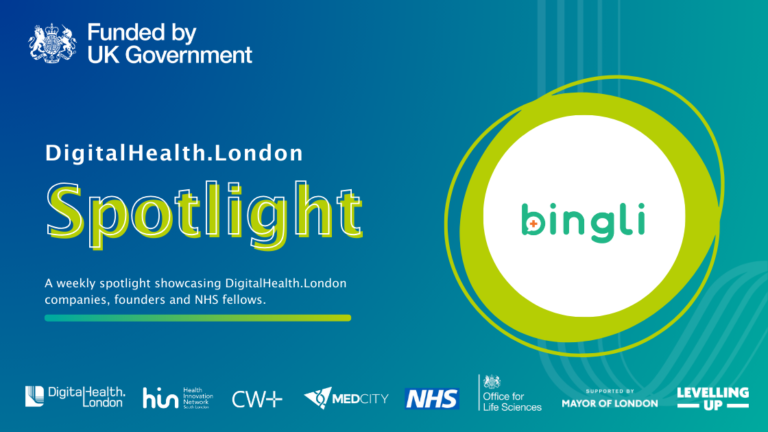Each week we spotlight one of our DigitalHealth.London businesses, founders or NHS fellows. Today we are excited to introduce Bingli, our current accelerator company DigitalHealth.London.


What is the problem you are trying to solve and why is it important?
The NHS faces a pressing challenge: meeting the increasing demands of a growing and aging population, while facing staff shortages. This problem is particularly pronounced in emergency departments, where patient expectations for timely, high-quality care are at an all-time high. Emergency department attendance, wait times and ambulance offload times have reached unprecedented levels, requiring a focused effort to maximize efficiency throughout the patient journey. By optimizing internal processes within emergency departments, we can significantly reduce the time it takes to make critical clinical decisions. Ensuring the safety and efficiency of these processes is essential to improving the patient experience, promoting patient safety, and maintaining smooth hospital flow.
What is the solution you have developed and how can it help solve the problem?
Most healthcare decisions are based on data collected by asking patients questions during history taking. This is time consuming and administratively cumbersome.
Bingli asks the right questions in advance using the most accurate AI. Patients can respond at their own pace, in their language (+18 languages).
By asking the right questions, we help patients get the right care by the right caregiver, at the right time, as quickly and cost-effectively as possible. It generates a list of differential diagnoses and other actionable information (e.g., triage scores) based on the responses provided by patients, enabling more productive and cost-effective consultations.
What is the history of your company?
The founders of Bingli (doctor and specialist in medical communication) have repeatedly noted how ineffective communication between patients and doctors is. They decided to develop a platform to improve this communication because good healthcare starts with good communication. Development began with clinical knowledge and medical reasoning, then sought the most appropriate technical solution (not the other way around). We are building a proprietary and most accurate differential diagnosis model, powered by AI, that mimics the way doctors think to improve history taking.
We believe our solution can bring empathy and efficiency back to healthcare.
What successes have you had so far through successful pilots/trials/contracts?
- 20% reduction in emergency treatment time: reduced wait times and increased capacity/availability of services
- 20% less time spent on administration (dematerialization, fully coded/structured information: Snomed CT, ICD10, ensuring EHR integration or PDF export)
- Cost reduction (fewer unnecessary technical investigations, less need for translators because Bingli is multilingual)
- Complete patient records with coded/structured data generate valuable data sets that can be used for analysis, decision-making, training, and identification of candidates for clinical studies.
- 90% diagnostic accuracy
- Empowered patients: patients can answer questions in their language (full multilingual support), taking into account health knowledge
- 30% of patients triaged/directed to appropriate level of care
What are your future goals? What does success look like?
In the short term, we aim to implement Bingli in as many emergency departments across the UK as possible to complement and strengthen ongoing efforts to improve patient care in UK healthcare. As we have developed a disease-agnostic tool, we want to expand from emergency departments to other services within and outside of hospitals, such as nursing advice lines and telehealth.
How has your time at the DigitalHealth.London Accelerator helped you achieve these goals?
As a non-UK business, understanding and navigating the NHS and being introduced to the right people will certainly help us achieve our goal of doing substantial business in the UK.
Do you have any advice for future digital health companies?
In your entrepreneurial journey, never hesitate to talk about your innovative product. The more you share, the more you open the doors to support, collaboration, and invaluable feedback. Remember, visibility is key to fostering connections and unlocking opportunities that can propel your startup to new heights. See openness as a strength, not a vulnerability.
Any requests for the public?
Presentations to decision makers for adopting innovation in emergency departments, other hospital services and other health services.
Bingli is currently part of Cohort 7 of the DigitalHealth.London Accelerator programme.
THE DigitalHealth.London Accelerator The program is funded by the UK government through the UK Shared Prosperity Fund (UKSPF). It is delivered by the Health Innovation Network (HIN) South London in partnership with the Office of Life Sciences, CW+, Medicity, NHS England, the Mayor of London and the Leveling Up Fund.
For more information, please visit https://www.gov.uk/government/publications/uk-
Shared Prosperity Fund prospectus.




